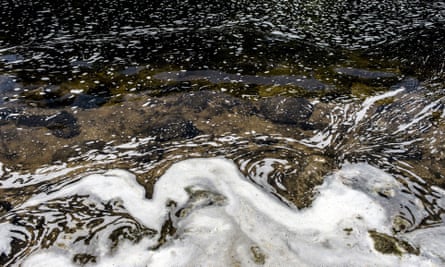Good morning.
Millions across the US have been caught up in dangerous weather conditions over the weekend and are braced for further extreme conditions ahead of today’s 4 July holiday, as thunderstorms and intense heat continue to affect much of the country.
As of yesterday, 36 million people are under excessive heat warnings in the US, particularly in the south and western areas, reported ABC News. Record high temperatures in some places will probably remain as many gear up to celebrate the Independence Day holiday on Tuesday.
Phoenix, Arizona’s capital city, was expected to hit a high temperature of 116F (46C) on Monday, the Associated Press reported, as temperatures remained above 100F (37C) throughout the weekend and, dangerously, did not come down much at night, straining power systems and giving little relief as residents try to stay cool.
Nevada faced its first heat advisory of the summer as Las Vegas was expected to reach 112F (44C) on Monday, reported the National Weather Service. Temperatures are forecast to remain above 105F (40.5C) for the rest of the week.
-
What else is happening? Many midwest cities are also dealing with the aftermath of severe rain and flooding. Weekend thunderstorms in Chicago flooded streets and highways as nearly nine inches of rain fell in some areas of the city in just a few hours, affecting trains as well as motorists. Many in the midwest are without power after the weekend storms.
High levels of toxic chemicals in pets living near US manufacturing plant

Pets living near a PFAS manufacturing plant in Fayetteville, North Carolina have concerning levels of the toxic chemicals in their blood, and have shown evidence of health effects linked to exposure, research has found.
PFAS were present in all 32 dog and 31 horse blood samples checked, and the findings provide evidence that human and animal exposures to the chemicals have an impact on their bodies, said Scott Belcher, a North Carolina State University researcher and co-author.
“It is just consistent with what we’ve seen over and over again, and it makes the case clear that these are toxic compounds,” he said.
PFAS are a class of about 15,000 compounds typically used to make products across dozens of industries resistant to water, stains and heat. They are called “forever chemicals” because they do not naturally break down, and are linked to cancer, kidney disease, liver conditions, immune disorders, birth defects and other serious health problems.
-
What’s happening in North Carolina? PFAS pollution from a Chemours plant in North Carolina has widely contaminated the soil, water and air for hundreds of square miles around the company’s Fayetteville Works plant, and residents have said their exposure to the chemicals is behind elevated cancer levels and other serious health problems. Residents have also said they suspect their pets have gotten sick from exposure to the chemicals.
Thousands of Palestinians flee Jenin refugee camp after major Israeli raid in West Bank

Several thousand Palestinians have fled their homes in the Jenin refugee camp in the north of the occupied West Bank after the launch of the biggest Israeli military operation in the area in two decades, according to Palestinian officials.
“There are about 3,000 people who have left the camp so far,” the Jenin deputy governor, Kamal Abu al-Roub, told the AFP news agency on Tuesday, adding that arrangements were being made to house them in schools and other shelters in Jenin city.
The Palestinian Red Crescent rescue service gave the same figure and said it expected the exodus to continue, amid suggestions from Israel that Operation Home and Garden could last several more days after beginning in the early hours of Monday morning.
UNRWA, the UN agency for Palestinian refugees, said many camp residents were in need of food, drinking water and milk powder as the fighting raged for a second day.
-
How are residents coping? Jenin, a poverty-stricken city in the north of the occupied West Bank, witnessed some of the worst fighting of the second intifada, or Palestinian uprising, of the 2000s. Two decades later, full-scale warfare has returned to the city’s streets, bringing old traumas to the surface for older generations and opening the eyes of younger ones.
In other news …

-
Meta’s answer to Twitter, a new app called Threads, will launch on Thursday, as users of the platform owned by Elon Musk seek out alternatives in droves. The Threads app, which is linked to Instagram, appeared in the Apple app store today ahead of its launch.
-
Four people have been killed and four others injured in a shooting in Philadelphia, and a suspect has been taken into custody, the Philadelphia Inquirer reported, citing local police. A spokesperson for the Philadelphia police department told Reuters no further details were immediately available.
-
China has accused the UK of protecting fugitives after the British foreign secretary criticised Hong Kong’s decision to offer HK$1m bounties for the arrest of eight democracy activists based overseas, as the territory’s leader said the group would be “pursued for life”.
-
China has called for the suspension of a Japanese plan to begin releasing radioactive water from the tsunami-wrecked Fukushima nuclear plant into the sea, ahead of a UN report that is expected to give its approval to the scheme. Beijing denounced the plan as “extremely irresponsible” when it was announced in 2021 and reiterated its opposition today.
-
Julian Sands spoke of feeling “chilled” by the discovery of human remains when pursuing his love of climbing, in his last UK interview before he died on a solo hike in California. The 65-year-old actor was a committed climber and said he increasingly ventured out alone.
Stat of the day: US maternal deaths have doubled since 1999 with most among Black mothers

Maternal deaths across the US have more than doubled over the course of two decades, with the most deaths occurring among Black women, researchers said. The findings were laid out in a study published on Monday in the Journal of the American Medical Association (Jama). Researchers looked at maternal deaths between 1999 and 2019 – but not the pandemic spike – for every state and five racial and ethnic groups. They found an estimated 1,210 maternal deaths in 2019, compared with 505 in 1999. The toll was not distributed equally, with some racial and ethnic groups faring worse than others. While Black mothers died at the nation’s highest rates, the greatest increases over time were seen among Native American and Alaska Native women, the researchers said.
Don’t miss this: on the Fourth of July, a few reasons to feel encouraged about US democracy

“It’s been a grim week or so in the United States, especially for those with progressive values,” writes Margaret Sullivan. In Baltimore, a deadly mass shooting underscored, again, how desperately gun reform is needed, and, tragically, how unlikely it is to happen. And in Washington, a spate of supreme court rulings undid decades of forward movement – the court’s rightwing majority rejected affirmative action in college admissions, favored religion over anti-discrimination laws and knocked down Joe Biden’s plan to forgive student loan debt. Add to that the one-year anniversary of the court’s devastating overturning of Roe v Wade, and you could practically hear the sound of hard-won progress being sucked down history’s drain. Pretty depressing, all told. But despite that, there are reasons to feel encouraged about the future of the nation on this, its 247th birthday.”
… or this: ‘Newsflash: we’re not all meek’ – how brash, funny Asian women took over our screens

On screen and in the wider western culture, women of Asian descent have long been tagged with the tropes of meekness and obedience – the good student (Mona in Pretty Little Liars), the compliant daughter (Jade Wu in Sweet Valley High) and the hard-working employee (Ingrid in Partner Track). Unfailingly polite, considerate and deferential, the model-est of the model minority. But that’s changing in a loud, significant way – and Joy Ride, out July, is the latest film to trash those old stereotypes. Starring Everything Everywhere All At Once’s Stephanie Hsu, Ashley Park from Emily in Paris and comedians Sherry Cola and Sabrina Wu (who uses they/them pronouns), Joy Ride doesn’t just centre the stories of four Asian-American women and non-binary people; it does so in a bawdy, raucous and unapologetically crass comedy.
Climate check: climate-heating El Niño has arrived and threatens lives, declares UN

The arrival of a climate-heating El Niño event has been declared by the UN’s World Meteorological Organization (WMO), with officials warning that preparation for extreme weather events is vital to save lives and livelihoods. The last major El Niño was in 2016, which remains the hottest year on record. The new El Niño comes on top of the increasing global heating driven by human-caused carbon emissions, an effect the WMO called a “double whammy”. This can supercharge extreme weather, and temperature records are already being broken on land and at sea across the globe. The WMO said there was now a 90% probability of the El Niño event continuing to the end of 2023 at a moderate strength or higher. The chance of a strong and even hotter El Niño at the year’s end was put at 56% by US authorities in an estimate in early June.
Last Thing: ‘It was an accident’: the scientists who have turned humid air into renewable power

In May, a team at the University of Massachusetts (UMass) Amherst published a paper declaring they had successfully generated a small but continuous electric current from humidity in the air. It’s a claim that will probably raise a few eyebrows, and when the team made the discovery that inspired this new research in 2018, it did. “To be frank, it was an accident,” said the study’s lead author, Prof Jun Yao. “We were actually interested in making a simple sensor for humidity in the air. But for whatever reason, the student who was working on that forgot to plug in the power.” The UMass Amherst team were surprised to find that the device, which comprised an array of microscopic tubes, or nanowires, was producing an electrical signal regardless.
Sign up
First Thing is delivered to thousands of inboxes every weekday. If you’re not already signed up, subscribe now.
Get in touch
If you have any questions or comments about any of our newsletters please email newsletters@theguardian.com



